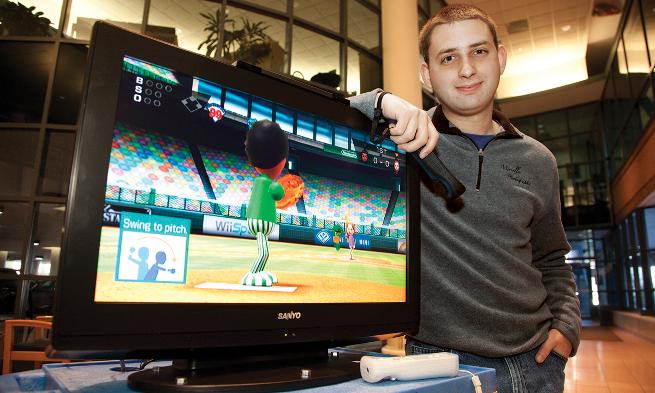Video game medicine
Science and Technology
By Jamie Marsh
Justin Minnion was in second grade when he suffered a blow to the head from a baseball bat. Brain surgeons saved his life, but he had to spend several weeks in the hospital recovering, confined to a bed with little to do except watch TV or sleep. Now, 11 years later, he actually smiles a little recalling those long days, not remembering medical tests and IV drips, but instead focusing on an anonymous gift of a Nintendo.
“He still talks about what a big difference it made to be able to play Mario Brothers,” says his brother-in-law Mike Miriello (’09M), an alumnus of the JMU College Student Personnel Administration Graduate Program.
Minnion’s experience inspired Miriello and his wife, Megan, to start the nonprofit organization PlayTime, which “helps kids just be kids when they’re in a very adult situation” through the fun of video games. “At first, we just wanted to donate a little money,” Miriello says, “but we realized the major gaming companies have long waiting lists and can be very expensive.” By purchasing the equipment — flat-screen TV, Nintendo Wii with “E” rated games, wireless controllers, lockbox — and assembling it on an industrial rolling cart in their garage, the Miriellos produced four carts for the price of one from a larger operation.
They found an eager partner at the Rockingham Memorial Hospital Foundation where vice president Merv Webb had been searching for exactly what the nascent philanthropists were offering. “Prior to Mike Miriello contacting the hospital, the perioperative director of RMH Surgical Services, Lori Robertson, had learned of a study that indicated children facing surgery had better outcomes when they were occupied with video games prior to surgery and had requested just such a unit,” Webb explains.
The study Robertson read was from Australian researchers who recommend several nondrug alternatives to “premeds,” including clown doctors, hypnosis, acupuncture and hand-held video games. Other studies concurred that people-based games like Mario or Zelda may help kids feel less isolated, and the excitement of a race-car game can substitute for some of the fun of being on a playground.
For children dreading a looming procedure — like the discomfort of a CAT scan or the pain of a burn dressing — the game can serve as a much-needed distraction. Take surgery, for example, a procedure where the child and parents usually have hours or days to prepare. Robertson says this is “often a time of mounting angst and anxiety” which leads to greater reliance on sedatives. “If we can divert or reduce their stress by engaging them with video games, that’s great. It’s therapeutic and calming.”
RMH had not found a retail store willing to donate the $920 worth of equipment, but Webb was able to spot a possible partnership between the Miriellos and the Kiwanis Club of Harrisonburg. After a short phone conversation, club president Debra Frank said she was “touched by Mike’s story about his brother-in-law Justin and inspired that he took that as a call to help children dealing with similar experiences. That’s what Kiwanis is all about: serving children.”
She invited Miriello to pre-sent his idea at a club meeting, where the membership voted to donate funds and one member cut a personal check on the spot. With this one pitch, Miriello received $1,840 — enough for two video game carts — and a lot of encouragement. “Many people have ideas, few act on them, and even fewer have the support to make it a reality,” Miriello says. “The Kiwanis gave me the support I needed to move forward.”
The carts were donated Jan. 28 to RMH, one for children undergoing surgery and another for the emergency room. The Miriellos say these two carts are just the beginning. They intend to keep raising money and constructing units for pediatric areas, and they envision making different versions for seniors, perhaps with more social games like Wii bowling. “We don’t want these to be cookie cutter. We want to keep PlayTime small and local so each unit is exactly what the hospitals need.”
They’ll be running the nonprofit in their spare time. “Giving my time is very fulfilling,” Miriello says. “I’m more than happy to do so daily.”
